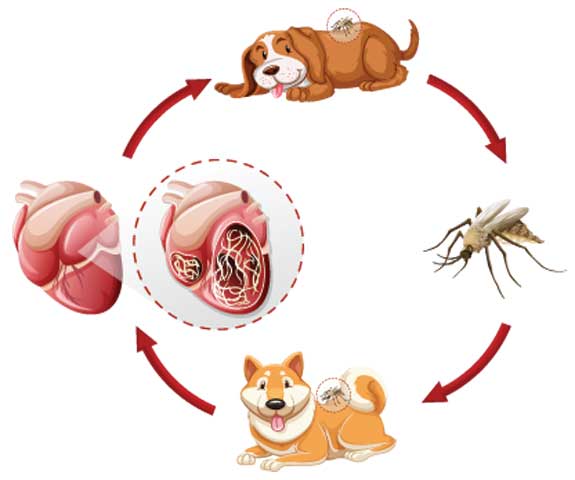A Beginner's Guide to Dog Heartworm Protection

As a pet parent, heartworm protection should always be one of your main concerns. But just like any other concern when it comes to your pup's health, knowing the facts is always the best preventative measure.
Let's get right into it.
WHAT ARE HEARTWORMS?
According to the American Heartworm Society, heartworm disease is a serious and potentially fatal disease in pets in the United States and many other parts of the world. It's known to be caused by foot-long worms (known as heartworms), which live in the heart, lungs, and associated blood vessels of affected pets. Data from the U.S. Food & Drug Administration also shows that the heartworm disease is most common along the Atlantic and Gulf coasts from the Gulf of Mexico, to New Jersey, and along the Mississippi River and its major tributaries, but it has been reported in dogs in all 50 states.
Heartworms are also quite known to affect cats and ferrets, but can also live in other mammals, including wolves, coyotes, foxes, sea lions, and on rare occasions, humans.
THE CAUSE
Heartworms are frequently transmitted from animal to animal by mosquitoes. When a mosquito bites an infected animal, the microscopic larvae of the worm will also be sucked along with the blood of the said animal. The larvae (microfilaria) tend to spend 2 weeks in the mosquito. After 2 weeks, when the mosquito sucks blood again, the larvae will then make its way to the bitten area, and further develop from the inside of its new host.

DISEASE DEVELOPMENT
In a span of 2 to 3 months, the worms will then break into a vein, and make its way into the lung artery through the heart. After 6-9 months, the worms will have already mated, releasing eggs through your dog's bloodstream, giving life to even more worms inside your dog's body. Some of the baby worms die during the dispersal, but some survive and continue the cycle.
THE SYMPTOMS
Your dog will likely appear asymptomatic at first. However, the FDA classified the symptoms into 4 stages.
STAGE ONE: Your dog will exhibit mild symptoms, such as an occasional cough.
STAGE TWO: Mild to moderate symptoms continue, such as lethargy after moderate activity.
STAGE THREE: Your dog will likely begin to exhibit a sick appearance and occasional cough and fatigue after moderate activities. Your dog may experience difficulty breathing and may begin to develop signs of heart failure. For stage 2 and 3 heartworm disease, these complications can usually be seen on chest X-rays.
STAGE FOUR: This stage is also known as caval syndrome. This is caused by a large mass of worms, which blocks blood flow to the heart. At this stage, quick surgical removal of the heartworms is the only solution.
Other symptoms may include reluctance to exercise, decreased appetite, and weight loss. A swollen belly due to excess fluid in the abdomen may also show in some cases.
It's important to remember that not all dogs with heartworms will end up with caval syndrome. However, if left untreated, mild symptoms can lead to more complicated situations.
THE TEST, PROTECTION, AND TREATMENT

Just like any other disease, prevention is always better than the cure.
Early diagnostics, whether x-rays or ultrasounds, will do the trick initially. But for a more practical approach, here are some methods you can consider.
A blood sample (on an antigen test) is a viable option, as it detects the agent shed by an adult female worm. A microscopic method of spotting baby heartworms in the blood can also be a way of knowing if your dog has heartworms.
Your vet may recommend monthly chewable pills and an injectable medication that is given every 6 to 12 months.
Outdoor bug control is also a decent option. In general, a clean and organized home is the way to go.
For treatment, the best option is to kill the worms present in your dog. This is not always an easy feat. Veterinarians will always try their best to do what they can while minimizing the side effects of treatment.
When testing positive for heartworms, you will need to restrict your dog's physical stimulation or exercise, as any intense movement can trigger the heart rate, which could then cause the worms to damage your pet's heart and lungs. Your veterinarian will then provide you with methods you need to follow which may require placing your dog under a long observation period.
THE WRAP-UP
Heartworms are indeed a hassle to both pet parents and pooches. Luckily for all of us, there are solid steps we can rely on to prevent heartworms from having their way. As always, regular checkups at the veterinarian are always key to making sure that your dog is in good shape.
Previous article

Next article

Related posts
View all-

5 Simple Tips to Make Sure Your Cat Drinks Enough Water
Ensuring your cat stays hydrated is important, but it can be challenging since many cats don't drink enough water. Dehydration can lead to kidney disease and other health issues. Fortunately, you can encourage your cat to drink more with a few simple changes. Read Article -

How to Keep Your Cat Busy at Night (So You Can Sleep)
For many cat owners, the quest for a good night's sleep while keeping their feline friends content and engaged can seem like a never-ending battle. Cats, naturally more active at night or early in the morning, often disrupt your sleep schedules with nocturnal activity, whether through playful nature or seeking attention. Read Article -

Should You Bathe Your Cat? Everything You Need to Know About Cat Hygiene
When it comes to cat hygiene, a common question among cat owners is, "Should you bathe your cat?" Understanding how to care for felines, especially bathing cats properly, is crucial for maintaining their overall health. Most cats are fastidious groomers, but specific scenarios like long-haired cats getting dirty or skin irritations, might require a bath.
Read Article



